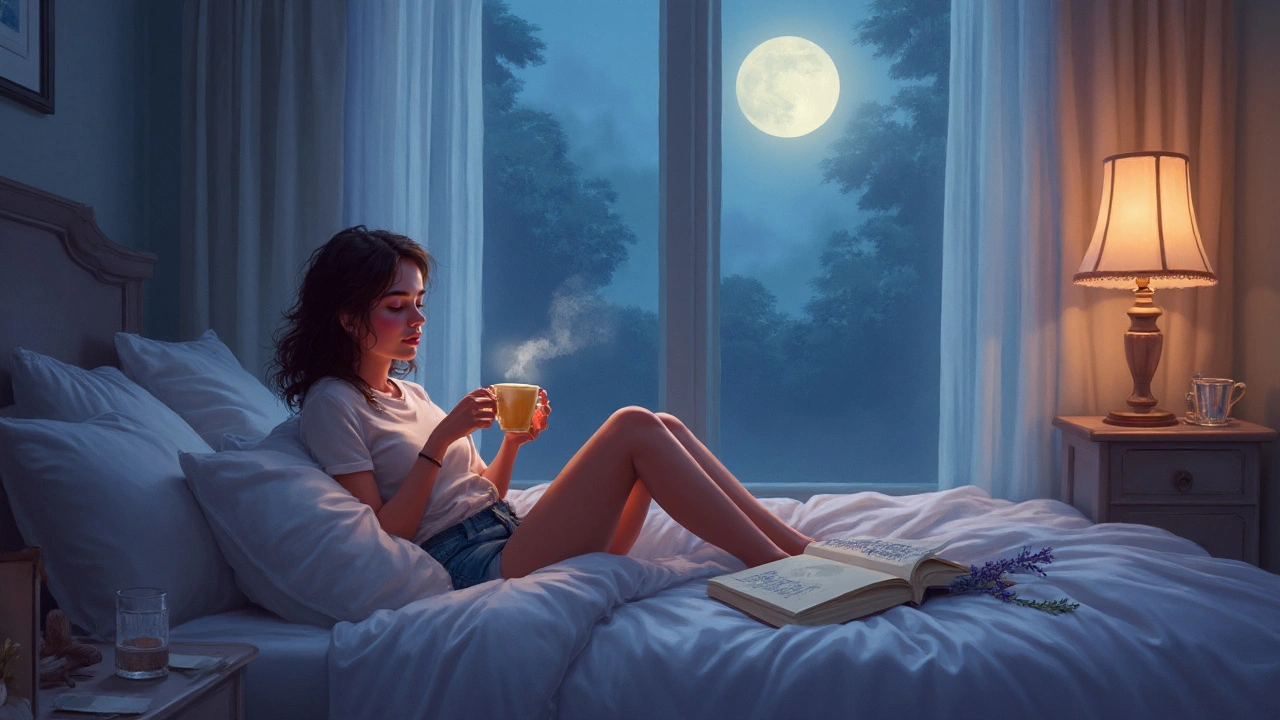Premenstrual Syndrome (PMS) is a recurrent set of physical and emotional symptoms that appear in the luteal phase of the menstrual cycle, typically 5‑14 days before menstruation. For many women, the most frustrating symptom is a sudden drop in sleep quality the depth and continuity of nightly rest, measured by factors like latency, awakenings, and total sleep time. Hormonal shifts, mood swings, and physical discomfort turn a regular bedtime into a guessing game.
Why PMS Messes with Your Sleep
Three biological culprits create the perfect storm:
- Estrogen peaks early in the cycle, then declines, leading to reduced serotonin production, which can trigger anxiety and night‑time wakefulness.
- Progesterone rises after ovulation, acting as a mild sedative; however, its drop just before menses leads to rebound hyper‑arousal.
- Cortisol the stress hormone, often spikes during the luteal phase, extending the time it takes to fall asleep.
The combination produces classic premenstrual insomnia, restless leg sensations, and fragmented REM cycles. Recognising the pattern is the first step toward reclaiming nights.
Sleep‑Friendly Lifestyle Tweaks
Simple habits can counteract hormonal turbulence:
- Consistent bedtime: Going to bed within a 30‑minute window each night stabilises the circadian rhythm the internal clock that governs sleep‑wake patterns.
- Limit blue‑light exposure high‑energy light from screens that suppresses melatonin production after 8pm; use amber glasses or night‑mode settings.
- Engage in moderate exercise aerobic activity such as brisk walking or cycling, performed earlier in the day. It raises body temperature, and the post‑exercise drop aids sleep.
- Keep the bedroom cool (around 18°C) and dark; a comfortable sleep environment temperature, noise level, and lighting conditions that promote uninterrupted rest reduces night‑time awakenings.
Nutrition Strategies That Calm the Night
Certain nutrients directly influence the hormones that disturb sleep:
- Magnesium a mineral that relaxes muscles and supports GABA activity, a neurotransmitter that encourages sleep. Aim for 300‑400mg from leafy greens, nuts, or a supplement.
- Calcium works with magnesium to stabilise nerve excitability; dairy, fortified soy milks, and tofu are good sources.
- Complex carbs (whole‑grain toast, sweet potatoes) boost serotonin, smoothing mood swings that often trigger night‑time rumination.
- Stay hydrated but limit fluids within two hours of bedtime to avoid bathroom trips.
Targeted Supplements & Natural Aids
When diet alone isn’t enough, evidence‑based supplements can fill the gap. Below is a quick side‑by‑side look.
| Aid | Typical Dose | Onset Time | Potential Side Effects |
|---|---|---|---|
| Melatonin a hormone that signals darkness to the brain | 0.5‑3mg 30min before bed | 15‑30minutes | Morning grogginess, vivid dreams |
| Chamomile Tea herbal infusion with apigenin, a mild anxiolytic | 1‑2 cups nightly | 30‑45minutes | Rare allergic reactions (especially in ragweed‑sensitive individuals) |
| Valerian Root plant extract that enhances GABA signaling | 400‑900mg 30min before sleep | 45‑60minutes | Headache, occasional dizziness |
Choose one aid at a time, monitor how your body reacts, and avoid mixing multiple supplements without professional guidance.

Behavioral Techniques Tailored for PMS
Psychological tools can neutralise the mental chatter that spikes during the luteal phase.
- Cognitive‑Behavioral Therapy for Insomnia (CBT‑I) a structured program that reshapes thoughts and behaviours around sleep. Even a three‑week self‑guided version reduces sleep latency by an average of 20minutes.
- Progressive muscle relaxation (PMR) performed in a dimly lit room lowers cortisol and eases PMS‑related cramps.
- Journaling before bed off‑loads worry cycles. Write down any PMS symptoms, then list three small actions you can take the next day.
When to Seek Professional Help
If insomnia persists beyond two weeks, or if you experience severe mood swings, consult a gynecologist a medical doctor specialising in female reproductive health. They can evaluate hormonal therapies (e.g., low‑dose birth control) that stabilize estrogen and progesterone, indirectly improving sleep.
A sleep specialist may also screen for underlying conditions such as restless leg syndrome or sleep apnea, which can masquerade as PMS‑related sleep disruption.
Putting It All Together: A Night‑by‑Night Checklist
- Two weeks before expected period: start magnesium (300mg) and limit caffeine after 2pm.
- Evening of high‑symptom days: brew chamomile tea, dim lights, and avoid screens.
- 30minutes before bed: take melatonin (if needed) and practice 5‑minute PMR.
- In bed: keep the room at 18°C, use a blackout curtain, and focus on slow breathing.
- If you awaken: get up, stretch lightly, and return to bed only when sleepy.
Following this routine for just a few cycles often transforms night‑time from a dreaded ordeal into a soothing ritual.
Key Takeaway
PMS sleep tips blend hormone‑aware nutrition, smart sleep hygiene, and evidence‑based supplements. By addressing the root hormonal shifts and supporting the body with targeted minerals and calming practices, most women can reclaim uninterrupted, restorative sleep during their luteal phase.

Frequently Asked Questions
Can melatonin worsen PMS symptoms?
Melatonin itself does not aggravate PMS. In fact, low‑dose melatonin can help offset the drop in natural production that occurs when progesterone falls. The key is to keep the dose modest (0.5‑3mg) and avoid taking it later than 30minutes before bed, which could disrupt the natural hormone balance.
Why does my leg feel tingly before my period?
Leg tingling is often a sign of Restless Leg Syndrome that peaks during the luteal phase due to altered iron metabolism and estrogen decline. Magnesium or low‑dose iron supplementation, coupled with stretching before bed, can relieve the sensations.
Is it safe to combine valerian and prescription sleep medication?
Mixing valerian with sedative prescription drugs (e.g., benzodiazepines) can amplify drowsiness and increase fall‑asleep time, leading to excessive next‑day grogginess. Always discuss with a doctor before stacking any sleep aid.
How long should I try a new sleep routine before expecting results?
Most changes need at least two full menstrual cycles (about two months) to reveal a pattern, because hormone fluctuations reset each cycle. Track sleep metrics in a journal to see gradual improvements.
Are there any over‑the‑counter options specifically for PMS‑related insomnia?
Products containing diphenhydramine (e.g., nighttime antihistamines) can help, but they may cause next‑day sedation. A safer route is a magnesium‑glycinate supplement paired with a low‑dose melatonin, both of which target the hormonal cause rather than just the symptom.


I am a pharmaceutical expert with over 20 years of experience in the industry. I am passionate about bringing awareness and education on the importance of medications and supplements in managing diseases. In my spare time, I love to write and share insights about the latest advancements and trends in pharmaceuticals. My goal is to make complex medical information accessible to everyone.